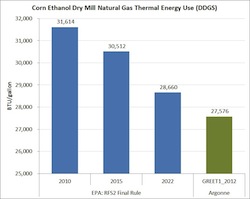The Renewable Fuels Association (RFA) is calling for the Environmental Protection Agency (EPA) to update their lifecycle greenhouse gas (GHG) analyses of corn and sugarcane ethanol for the Renewable Fuel Standard (RFS). The association made the request in a letter sent to the EPA Administrator Lisa Jackson.
RFA President and CEO Bob Dinneen wrote, “There have been literally dozens of new studies and modeling improvements since EPA finalized the RFS2 almost three years ago. Overwhelmingly, these new reports and data show that the corn ethanol process is far less carbon intensive than assumed by EPA. Corn ethanol is offering real  and significant GHG savings today. Meanwhile, the carbon intensity of crude oil production continues to worsen, as we drill farther and deeper than ever before and get more of our energy from marginal crude sources like tar sands.”
and significant GHG savings today. Meanwhile, the carbon intensity of crude oil production continues to worsen, as we drill farther and deeper than ever before and get more of our energy from marginal crude sources like tar sands.”
Also noted in the letter is that recent GHG research has shown than lifecycle GHG emissions associated with Brazilian sugarcane ethanol production are worse than originally estimated by EPA. The letter cites since 2006, harvested sugarcane in Brazil has expanded 55 percent with at least 70 percent of the land formerly pasture land. However, when the lifecycle analysis was originally conducted, little land use change emissions were factored in to the data.
While RFA says the EPA underestimated land use change emissions for sugarcane, they also say the EPA overestimated ethanol plant energy use, corn farming energy use and land use change emissions for other forms of ethanol, primarily ethanol produced from corn.
Recent modeling and data improvements were presented in a peer-reviewed paper by researchers at Purdue University and the Department of Energy. According to the research, corn ethanol, on average, reduces GHG emissions today by at least 24 percent compared to gasoline even with speculative LUC emissions included. GHG reductions for ethanol from dry mill plants are even larger. Dinneen concluded that it is imperative that EPA recognizes this new science and data.
Click here to read the letter in full along with supporting charts and sources.

